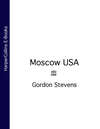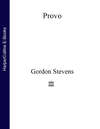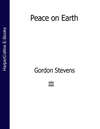Kitabı oku: «Kennedy’s Ghost»

GORDON STEVENS
Kennedy’s Ghost

COPYRIGHT
Kennedy’s Ghost is a work of fiction. All of the events, characters, names and places depicted in this novel are entirely fictitious or are used fictitiously.
HarperCollinsPublishers Ltd.
1 London Bridge Street
London SE1 9GF
First published in Great Britain by HarperCollinsPublishers 1994
Copyright © Gordon Stevens 1994
Gordon Stevens asserts the moral right to be identified as the author of this work
All rights reserved under International and Pan-American Copyright Conventions. By payment of the required fees, you have been granted the nonexclusive, nontransferable right to access and read the text of this ebook on-screen. No part of this text may be reproduced, transmitted, downloaded, decompiled, reverse-engineered, or stored in or introduced into any information storage and retrieval system, in any form or by any means, whether electronic or mechanical, now known or hereafter invented, without the express written permission of HarperCollins ebooks
HarperCollinsPublishers has made every reasonable effort to ensure that any picture content and written content in this ebook has been included or removed in accordance with the contractual and technological constraints in operation at the time of publication
Source ISBN: 9780006490029
Ebook Edition © SEPTEMBER 2016 ISBN: 9780008219352
Version: 2016-09-21
DEDICATION
To Art Kosatka,
for introducing me to Washington DC
through the back door
and without whom this book
would not have been possible
CONTENTS
Cover
Title Page
Copyright
Dedication
Prologue
Chapter 1
Chapter 2
Chapter 3
Chapter 4
Chapter 5
Chapter 6
Chapter 7
Chapter 8
Chapter 9
Chapter 10
Chapter 11
Chapter 12
Chapter 13
Chapter 14
Chapter 15
Chapter 16
Chapter 17
Chapter 18
Chapter 19
Keep Reading
About the Author
Other Books By
About the Publisher
PROLOGUE
It was the sort of day you remembered. Where you were when you heard and what you were doing; who you turned to and who you telephoned.
The assassin was in position at eleven, the cars which would steer the Lincoln into the killing zone at eleven-five. The truck which would break down in the left lane of the traffic lights, ensuring that the Lincoln would move to the right-hand lane, at eleven-six. The yellow sedan which would stall in front of the Lincoln by eleven-seven.
The senator’s flight from Boston was on schedule; his Lincoln, plus the man who would accompany him, already waiting. Twenty-five years before, Donaghue and Brettlaw had been undergraduates together at Harvard.
At eleven-fifty Donaghue would join his wife and daughters in his room on the third floor of the Senate Russell Building on Washington’s Capitol Hill. At one minute to twelve he would walk with them along the marble corridor to the historic setting of the Caucus Room. And at midday exactly, with his wife at his side and Brettlaw in the wings, Senator Jack Donaghue would formally announce his candidacy for the Democratic nomination for the Presidency of the United States of America.
It was eleven-fifteen. In the Caucus Room the television cameras were in place and the lights ready, the cables running to the scanners outside. The walls of the room were marble, the slim Corinthian-style columns rising to the ceiling, and the ceiling itself was exquisitely decorated with four large chandeliers hanging from it. The windows on the side of the room facing the dome of Capitol Hill were wall-height, arched at the top and draped in purple. On the wall opposite them, on either side of the door leading into the hallway beyond, two plaques listed some of the events to which the Caucus Room had born witness: the 1912 enquiry into the sinking of the Titanic, the 1941–42 commission into the World War Two National Defense programme, the 1966 Fulbright hearings on the Vietnam War, the 1973 Watergate enquiry and the 1987 commission on Iran-Contra.
The platform from which Donaghue would declare was against the right-hand wall, flanked on the right by the Stars and Stripes of the Union and on the left by the flag of his home state of Massachusetts, two massive black and white photographs hanging on the wall behind and dominating the room.
‘Why the Kennedy photos as backdrop?’ the NBC reporter asked the Donaghue press secretary. ‘Why John and Robert?’
‘Because they also declared in this room,’ she told him.
The floor was packed with supporters, already excited and some singing. Most such crowds were the same, the CBS reporter knew: young and preppy, a blaze of hats and banners. Not this one, though; this one was different. Young and old, a range of ages, creeds and colours. As if they not only stood for what the country had struggled for in the past, but also represented the dream it still clung to for the future. Blue-collar and white-collar, men and women, youthful students and gnarled veterans. Three of them in the second row talking about a Swift boat in ’Nam and laughing about the way The Old Man had bellowed into a bullhorn for the boats they knew didn’t exist to follow him in.
The woman in the front row was young, the radiance of youth on her face, her blond hair falling on to her shoulders and her child in her arms. The man next to her was in the dress blues of the Marine Corps, the eagle, globe and anchor on the collar, the sergeant’s chevrons on his sleeves, and the medal ribbons across his left breast, the top row the most important and the ribbon on the wearer’s right of the top row the most important of all. The ribbon next to it was the Silver Star, after that the Bronze Star, three stars on it indicating it had been won three more times and the ‘V’ indicating they had been won for heroism in battle. The service ribbons at the bottom, the Vietnam service ribbon in the middle.
‘Mind if I take a close-up of the decorations?’ one of the cameramen asked.
‘No problem,’ the marine told him.
‘What was that all about?’ the reporter asked as he and the cameraman moved on.
‘You see what he was wearing?’ The response was tight, almost angry. ‘Top right, next to the Silver Star. The Congressional Medal of Honor.’
The highest award for valour the nation could bestow.
‘Mommy,’ the reporter heard the voice of the girl in the arms of the young woman next to the marine. ‘Why has that man only got one arm?’
It was eleven-twenty, the morning bright and the silver of the 737 gleaming against the faultless blue of the sky. Ten minutes to landing, the pilot informed his passengers. In the second row from the front Donaghue checked the speech for the last time and whispered the words of the first quote. Perhaps to Pearson, perhaps to himself.
Some men see things as they are and say why;
I dream things that never were and say why not.
The boy was ten years old, seated with his mother towards the rear.
‘You think he’ll mind?’
Of course he’ll mind, the woman knew she should say. He’s busy, too many things on his mind, especially today. ‘Ask him,’ she said instead.
‘Come with me.’
‘Go by yourself.’
The boy gripped the Polaroid camera and made his way down the aisle, the nerves consuming him. Halfway along he hesitated and looked back, saw the way his mother nodded for him to go on.
‘Excuse me.’ He stopped by the two men seated on the left and realized he had forgotten to say sir. ‘Would you mind if I took your photograph?’
Donaghue smiled at the boy and turned to Pearson.
‘I think we can go better than that, don’t you, Ed?’
‘Sure we can.’
Fifteen rows back the woman watched as Pearson stood, took the camera from her son, sat him by Donaghue, and took a photograph of the two of them together. The boy watched as the print rolled out and the image rose on the slippery grey of the plastic.
‘What’s your name?’ Donaghue asked him.
‘Dan.’
‘Dan who?’
‘Dan Zupolski.’
The print was dry. Donaghue took a pen from his pocket and signed it.
To Dan Zupolski, from his friend, Senator Jack Donaghue.
It was eleven twenty-five.
In the Caucus Room the doors opened and the supporters turned, suddenly expectant, the television crews cursing that they had not been forewarned. Catherine Donaghue walked in and stood on the platform. Mid-forties and slim; the blond of her hair and the steel and the sun in her eyes.
‘Sorry to give you a heart attack, boys.’ She knew what the crews had thought and smiled at them, acknowledged the way they laughed back.
He’d seen it all before, the NBC correspondent thought. Except not like this, not like today. He wouldn’t admit it, of course, but one hell of a day to be the front man, one hell of a thing to tell the grandkids.
One hell of a smile, the CBS man whispered to no one in particular. One hell of a First Lady.
Cath Donaghue looked round the crowd. ‘I thought you’d like to know. We’ve just heard from the airport. Jack’s plane is five minutes out; he’ll be landing on time at eleven-thirty, be here at twelve.’
There was a roar. She held up her hands to still it.
If this was the prelim, Christ knows what the main event is going to be like, the CNN reporter thought. Give me some cut-aways now, he told his cameraman. Couple of veterans, couple of kids.
‘How’s it looking?’ He heard the voice of his producer down the line.
‘Looking good.’
Looking fantastic, he meant.
‘What time’s he due?’
‘Twelve noon, everything on schedule. Why?’
‘We’re going live on it.’ CNN network, CNN global. ‘Coming to you at eleven fifty-five.’
The applause quietened, the supporters waiting. Cath Donaghue looked up and smiled again.
‘Before Jack arrives, I just wanted to thank you all for coming today.’ As if the honour was hers and Jack’s; as if, by being present at that place on that day, it was those in front of her who were doing the Donaghues a favour.
She looked around them again and smiled again. Take care of him, Dave, she prayed; make sure he gets here, please God don’t let me down.
‘It’s a great place to be, a great day to be here. Thank you all.’
Even after she had left, even after she was back in Room 394, the cheers were echoing round the Caucus Room and the applause was ringing down the white marble of the corridors.
It was eleven twenty-eight.
The 737 banked over the Potomac and began its run-in, the wing lights blinking against the silver and the silver brilliant against the morning sky.
Jordan glanced at Donaghue and realized he was looking at the White House.
‘Ready, Jack?’
What are you thinking? he almost asked.
I’m thinking about something Haslam said, Donaghue would not have told him. I’m thinking about a conversation Haslam and I agreed never took place.
‘As I’ll ever be.’
The 737 bumped gently on the runway, the reverse thrust thundering, then taxied to the terminal. The flight-deck door opened and the pilot and copilot stepped out and stood with the cabin crew at the front of the plane. The fuselage door to the terminal opened. In the passenger bridge on the other side Jordan saw the line of officials.
‘Okay, Jack. Let’s do it.’
Donaghue stood and straightened his suit, Pearson slightly behind him and Jordan at his shoulder. The rest of the passengers were still seated, all watching. He passed along the line of crew members and shook each of their hands.
‘Give it to ’em today, Jack.’ The voice was from the back of the plane.
‘Good luck, Mr President.’ Another.
Abruptly the passengers rose and began to clap. Donaghue turned and waved his thanks at them, then left the plane and stepped through the jet bridge and into the terminal, everyone wanting to shake his hand this morning, everyone wanting to wish him luck. Some addressing him as Jack, others as Senator. More than the occasional person calling him Mr President.
The doors of the Lincoln were open. Brettlaw stepped forward and Donaghue shook hands with him, embraced him.
‘Good to see you.’
‘You too, old friend.’
Eleven thirty-three.
The Lincoln left National.
Hendricks checked his watch. Not much traffic today, therefore the target on time.
Even though the road out of the underpass was in front of him and the glistening white of Capitol Hill was behind and to his left, he saw it differently, as if he was the driver of the Lincoln, as if he was the man delivering the target to the killing zone.
Right out of National and on to George Washington Parkway – he ran through the route again. Off the Parkway and across 14th Street Bridge. Fork right at the end into the series of underpasses dissecting DC, the cars which would funnel the Lincoln into the correct lane, and into the correct position in the killing zone, already closing. First underpass then second, right at the first exit but still underground, then right again at the second exit, the carriageway of this section single-lane, still climbing and curving left, then straightening into the sunlight. Sixty yards from the underpass to the traffic lights at First. White multistorey housing the National Association of Letter Carriers on the right, and side road joining the underpass road from behind the multistorey, so that at the junction with First the road was two-lane. Six-foot-wide central reservation of grass and trees to the left and wire fence down the middle, and the road on the other side leading only to an underground car park. Grey multistorey of the Federal Home Loan Bank beyond the road. Grass and more traffic lights in front and leading to the Hill.
Everything quiet, little traffic and hardly any pedestrians. Everything perfect.
Eleven thirty-four.
The Lincoln eased on to George Washington Memorial Parkway.
Thirty-five.
The Lincoln pulled right, off the Parkway and across 14th Street Bridge, the grey-blue of the Potomac below them and the white of DC suddenly in front. The white always dazzling, but this morning almost blinding. Fork at end of bridge, Route N1 goes left and Route 395 right.
The Lincoln swung right on to 395.
Eleven thirty-seven.
First exit, to Maine Avenue. First underpass coming up. The dark blue Chevrolet fell in behind them then drew to the outside lane, but not overtaking.
Thirty-eight.
First underpass. Two-lane. Short. Out of the underpass in fifteen seconds.
The pale Chrysler sedan eased in front of them, the Chevrolet behind them still in the outer lane and preventing them from overtaking.
Thirty-nine.
Hendricks saw the truck edge from the feeder road at the side of the Letter Carriers building, the engine clattering and the smoke billowing from its exhaust. The lights at First were on green. The truck crossed to the left lane, jerked apparently haphazardly towards the lights, and shuddered to a halt at them.
Eleven-forty.
Ford replacing the Chrysler and Oldsmobile replacing the Chevrolet. Yellow sedan three hundred yards in front.
Donaghue reached into his jacket pocket and glanced again at the speech, read again the quote he had included at the request of his wife. The quote after which he would pause, after which he would look down reflectively then look up again, after which he would declare he was running for the White House.
In the long history of the world
few generations have been granted
the role of defending freedom
in its hour of maximum danger.
I do not shirk from this responsibility
I welcome it.
Except that in his mind he had rewritten it slightly:
In the long history of the world
few generations have been granted
the role of defending freedom.
In the hour of maximum danger
I do not shirk from this responsibility.
I welcome it.
Two hundred yards in front the yellow sedan drew them in as if they were on a piece of string.
Eleven forty-one.
The Lincoln closed on the second underpass and entered its darkness. The underpass was long and curving, pale in the overhead lights. The underpass was climbing slightly, the first exit – D Street NW and US Capitol – coming up fast. The climb was steeper, they turned right, the yellow sedan in front and the Lincoln behind, the Oldsmobile behind it, the Ford keeping to the main carriageway and accelerating away.
The light of the exit was in front of them, the carriageway still climbing out of the underpass. Second exit, D Street straight on, Capitol right. Yellow sedan going right, the Lincoln following it, Oldsmobile straight on. The underpass still single-lane, still curving and climbing.
Eleven forty-two.
They left the underpass and drove into the brilliant sunlight of the killing zone. The white building of the Letter Carriers Association towering over them to the right and the grey of the Home Loan Bank to the left. The side road joining from the right, so that the single-lane became two lanes and the lights sixty yards in front. The truck broken down in the left lane and the yellow sedan suddenly stalling beside it in the right. The Lincoln immediately behind the sedan, more traffic behind it so it was unable to move, and the man called Hendricks waiting.
Twenty-eight years before, on 22 November 1963, President John F. Kennedy had been assassinated in Dallas, Texas.
Four months earlier …
1
They should have waited for the back-up, Cipriani knew.
Of course they sometimes got separated, of course they sometimes ran in to problems, but the back-up car should have caught them up by now.
The evening was warm, early June and still two hours of daylight left, the dual carriageway curving slightly in front of them and the pines rising up the mountainside to their left and falling to the valley to their right. Perhaps that was why Moretti hadn’t noticed. Because they were from the city and therefore expected trouble in the city; because this was Switzerland and nothing happened in Switzerland except they made cuckoo clocks and lots of money.
South, across the border into Italy, and Cipriani would have begun to worry, would have whispered to Moretti to slow it. Except that Mr Benini liked to be driven fast. If they slowed the banker would glance up from the rear seat and ask what the hell was happening without uttering a single word.
And nobody knew they were here.
He and Benini had flown out of Milan the previous afternoon, stayed last night at London’s Grosvenor House Hotel, Mr Benini attending a meeting at the bank’s office on Old Broad Street this morning, then the flight back. But not to Italy. To Switzerland. Moretti, Gino and Enzio driving up to meet them. The afternoon in the bank’s Zurich office, then the overnight in the slightly old-fashioned hotel in the mountains which Mr Benini preferred to the more modern establishments in the city. More meetings tomorrow, then the flight back to Milan. Depending, of course, on the twists and turns of Mr Benini’s timetable.
If it had been Milan – on the way to or from the family villa in Emilia at weekends, from the apartment on Via Ventura in the morning or the office behind La Scala in the evening – they would have been on edge, would have worked one of the dozen variations of route. But this wasn’t Italy.
The police car was on the hard shoulder a hundred metres in front of them; as they passed it rocked in their tailstream. Still no back-up Merc – Cipriani adjusted the second of the two rearview mirrors – still no Gino and Enzio sitting like guardian angels behind them. The movement was enough to warn Moretti; the driver glanced up then the rev counter dropped slightly as he eased back. Not enough to disturb the man in the rear seat, but enough to slow them by ten kilometres an hour.
The road was still curving, still climbing gently, no other traffic.
The police car passed them, suddenly and unexpectedly, then slowed in front of them, the observer waving them down.
The layby was gravel, forty metres long and a car’s width wide. They pulled in behind the police car and waited. In the back seat the banker glanced up. The police driver left the Audi and walked towards them, the observer remaining seated and facing forward. Cipriani got out and shut the door behind him, heard the dull click as Moretti locked the doors.
Standard procedure. The driver never leaving the car. Doors and windows locked, vehicle in gear and held on the clutch, handbrake off. Enough space to pull away even if it meant driving over whatever or whoever was in front, even a policeman. More correctly, even someone wearing a police uniform. For this reason Cipriani did nothing to obstruct Moretti’s get-away route or his line of vision.
The 450 was armour-plated – up to a point. Ten-millimetre glazing on the windows; Spectra plating for doors, sides, roof-liner and floor boards; plus cell fuel tank. Not the protection some of the Saudis carried, but Benini was still Benini.
‘One of your tyres is going down.’ The policeman spoke with what Cipriani assumed was the regional accent.
‘Which one?’
The wheels were reinforced, a steel rim between the hub and tyre, so the car could run even if the tyres had been ripped by bullets. Except that the opposition would know that.
Cipriani confirmed the observer was still seated and his door was still closed, confirmed that the driver’s gun was still strapped in its holster.
‘Rear left.’
Coincidence that the police car had happened to be parked up on their route out of the city – Cipriani was tight with adrenalin. Coincidence that the tyre was on the driver’s side so that he had to walk round the car to see it? Coincidence that if he walked round the front of the car he would obstruct Moretti’s vision and exit path, but if he walked round the back he would lose sight of the policeman’s hand and gun.
Moretti rolled the Merc back slightly and turned the front wheels so they were pointing out.
Giuseppi Vitali had made the call to the Grosvenor House Hotel shortly after Benini and Cipriani had left. Ask for Benini and he’d never get through; ask for the bodyguard, however, and he’d know everything he needed to about the banker.
‘I’m sorry,’ he had been told, ‘Mr Cipriani checked out fifteen minutes ago.’
Benini running to schedule, probably on his way to BCI’s offices on Old Broad Street, then to Heathrow. And from there he would fly either to Milan or Zurich. Except that yesterday afternoon, after they’d dropped Benini and his bodyguard off, his driver and the two gorillas who constituted his back-up protection had left Italy for Switzerland. So after his meeting in London, Benini would fly to Zurich. And that evening Moretti would drive him to the hotel in the mountains which Benini used when his meetings required him to stay in Switzerland. Unless Benini was intending to drive back, which he had never done in the past.
Giuseppi Vitali knew everything about Paolo Benini. His family details, his education and banking career. His business and personal movements, the fact that at that moment in time he did not have a regular mistress. The houses he owned and the hotels and apartments in which he stayed.
The details of his personal protection. The various routes Moretti used to drive him to work and the patterns into which even Cipriani had allowed them to slip when he thought they were safe.
The fact that the bank for which Benini worked carried kidnap insurance.
Cipriani turned slightly and walked behind the Mercedes, eyes flicking between the man in front and the second in the Audi. So where was the back-up, where the hell were Gino and Enzio? The police driver stepped forward, the top of his body above the Merc but the lower half now hidden. Was beside Moretti’s window. The door of the police car opened and the second man got out.
Moretti’s going, Cipriani sensed; half a second more and Moretti’s going to smash his foot on the accelerator and pull Mr Benini out. His left hand moved inside his coat to the submachine gun hanging on the pull strap from his shoulder.
‘Which tyre?’ he asked again.
Clear the car then he would have to bend down and look at the tyre, would have to take his eyes off the driver. Then they would take him.
‘Left rear.’
He heard the slight rev of the engine. Moretti telling him he had everything under control, that if either of the supposed policemen moved out of turn Moretti would run them down.
The strap was still across the gun in the policeman’s holster but the police observer was further out of the door. Cipriani glanced at the tyre. Perhaps it was down slightly, perhaps it wasn’t.
‘Thanks. I’ll take care of it.’
Therefore no need for you to hang around. If you are who you say you are.
And your move if you’re not.
There was a burst on the radio of the police car. The observer confirmed their position then called to the driver. ‘Accident, let’s go.’
‘Thanks again,’ Cipriani said.
The driver ran to the car and the Audi pulled away.
There was a screech of brakes and the back-up pulled in behind them.
That evening Paolo Benini ate alone, Cipriani three tables away and also alone, and the others only entering the dining-room after Benini had left. Perhaps by instinct, but more probably by habit, Benini avoided giving the impression that he was surrounded by bodyguards. When he had finished Cipriani escorted him to the third-floor suite, then returned to the others. Benini poured himself a malt and settled to the paperwork he had brought with him from the Zurich office. Nothing confidential – he was always careful with material he took outside the bank.
Paolo Benini was forty-four years old, six feet tall, with dark, neatly cut hair, and the first signs of good living showing on what had once been an athletic frame. His wife Francesca was six years younger. The couple had two daughters, both in their early teens, a town apartment in Via Ventura, in one of Milan’s discreetly fashionable (as opposed to ostentatiously expensive) areas, and a villa in the family village in Emilia.
Paolo Benini also enjoyed a succession of mistresses, a fact which he considered the natural right of someone of his background and profession, but which he also considered he had successfully kept secret from his wife.
Secrets within secrets, he had once thought. It was a principle he also applied to his work, though he would have used a different word. Security. Not merely the separation of one project from another, even the separation of parts of the same project. The creation of a structure in which the beginning could not be traced to the middle, nor the middle to the end. A structure in which key people such as the London manager were all personal appointees, yet in which even those he trusted knew only what he allowed them to know, with no way two of them could fit even a part of the whole together.
Especially the special accounts: the funds originating in what he assumed were front companies in North America and Western Europe, then switched via a system of cut-outs to their target accounts. Not simply because the destinations were tax havens, but because in such places banking regulations were loose and rarely monitored. And because, in routing such transfers through a series of tax regimes, each with its own rules and regulations on secrecy, the job of tracing those funds was rendered virtually impossible.
Every bank had its special account customers, of course, but this normally meant only those clients requiring customized attention. So the handful of executives and board members in BCI who knew he was special accounts assumed his dealings were nothing out of the ordinary.
Black accounts in black boxes, he had once thought. Even he himself in one. Knowing the codes for the accounts and speaking occasionally to the account holders, but knowing nothing more and not wishing to.
The telephone rang shortly before eleven.
‘Mr Benini. Reception here. A fax has just come in for you and I thought you’d wish to know immediately.’
Because Mr Benini was a regular, and Mr Benini tipped well.
‘The morning will do. But thanks, for letting me know.’
He waited ten seconds, then lifted the telephone again and called reception.
Cipriani had drummed the routine into him. If he received a call from someone claiming to be hotel reception, porters’ desk, even room service or laundry, he should stall. Then he should phone back unexpectedly on the correct line. If reception or whatever confirmed the call, then everything was fine. If not, he should check the door was locked and hit the panic button.
‘This is Paolo Benini. The fax you just phoned about.’
‘Yes, Mr Benini.’
Confirmation that it had been reception who had called.
‘I just wondered where it was from.’
‘One moment while I check.’ There was a ten-second pause. ‘Milan, sir.’
Confirmation that there was a fax.
‘Perhaps you could send it up after all.’
He had barely settled again when he heard the knock on the outer door. He crossed the room and checked through the security hole. The porter was alone in the corridor, his uniform immaculate, his right hand at his side and the envelope containing the fax in his left.




